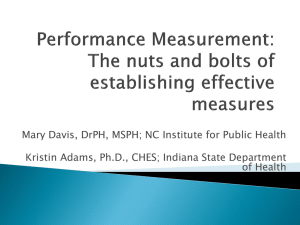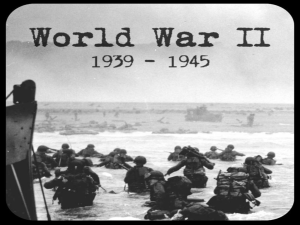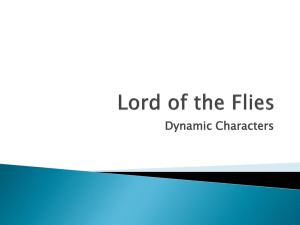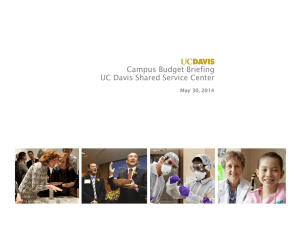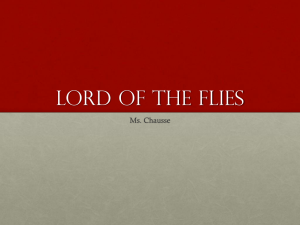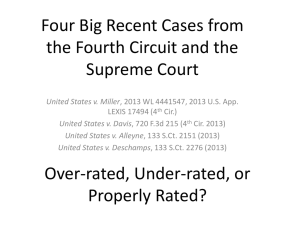POWERPOINT Lord of the Flies Full Unit
advertisement
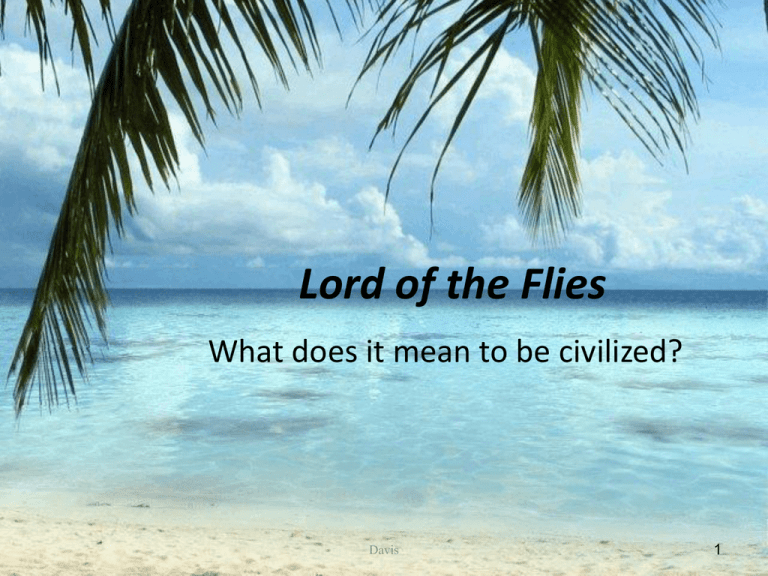
Lord of the Flies What does it mean to be civilized? Davis 1 Common Core State Standards in Lord of the Flies Key Ideas and Details • 10.RL.1 Cite strong and thorough textual evidence to support analysis of what the text says explicitly as well as inferences drawn from the text. • 10.RL.2 Determine a theme or central idea of a text and analyze in detail its development over the course of the text, including how it emerges and is shaped and refined by specific details; provide an objective summary of the text. • 10.RL.3 Analyze how complex characters (e.g., those with multiple or conflicting motivations) develop over the course of a text, interact with other characters, and advance the plot or develop the theme. Davis 2 Common Core State Standards in Lord of the Flies Craft and Structure •10.RL.4 Determine the meaning of words and phrases as they are used in the text, including figurative and connotative meanings; analyze the cumulative impact of specific word choices on meaning and tone (e.g., how the language evokes a sense of time and place; how it sets a formal or informal tone). •10.RL.5 Analyze how an author’s choices concerning how to structure a text, order events within it (e.g., parallel plots), and manipulate time (e.g., pacing, flashbacks) create such effects as mystery, tension, or surprise. •10.RL.6 Analyze a particular point of view or cultural experience reflected in a work of literature from outside the United States, drawing on a wide reading of world literature. Davis 3 Common Core State Standards in Lord of the Flies Integration of Knowledge and Ideas •10.RL.7 Analyze the representation of a subject or a key scene in two different artistic mediums, including what is emphasized or absent in each treatment •10.RL.9 Analyze how an author draws on and transforms source material in a specific work (e.g., how Shakespeare treats a theme or topic from Ovid or the Bible or how a later author draws on a play by Shakespeare). [allusions and inspirations] Range of Reading and Level of Text Complexity •10.RL.10 By the end of grade 10, read and comprehend literature, including stories, dramas, and poems, at the high end of the grades 9–10 text complexity band independently and proficiently [without scaffolding]. Davis 4 Common Core State Standards in Lord of the Flies • 10.W.3 Write narratives to develop real or imagined experiences or events using effective technique, well-chosen details, and well-structured event sequences. b. Use narrative techniques, such as dialogue, pacing, description, reflection, and multiple plot lines, to develop experiences, events, and/or characters. c. Use a variety of techniques to sequence events so that they build on one another to create a coherent whole. d. Use precise words and phrases, telling details, and sensory language to convey a vivid picture of the experiences, events, setting, and/or characters. • 10.W.9 Draw evidence from literary or informational texts to support analysis, reflection, and research. a.Apply grades 9–10 Reading standards to literature (e.g., “Analyze how an author draws on and transforms source material in a specific work [e.g., how Shakespeare treats a theme or topic from Ovid or the Bible or how a later author draws on a play by Shakespeare]”). • 10.W.10 To write routinely over extended time periods and for shorter time frames for a range of tasks, purposes, and audiences. Davis 5 Common Core State Standards in Lord of the Flies • 10. SL.1 Initiate and participate effectively in a range of collaborative discussions (one-on-one, in groups, and teacher-led) with diverse partners on grades 9–10 topics, texts, and issues, building on others’ ideas and expressing their own clearly and persuasively. a. Come to discussions prepared, having read and researched material under study; explicitly draw on that preparation by referring to evidence from texts and other research on the topic or issue to stimulate a thoughtful, well-reasoned exchange of ideas. b. Work with peers to set rules for collegial discussions and decision-making (e.g., informal consensus, taking votes on key issues, presentation of alternate views), clear goals and deadlines, and individual roles as needed. c. Propel conversations by posing and responding to questions that relate the current discussion to broader themes or larger ideas; actively incorporate others into the discussion; and clarify, verify, or challenge ideas and conclusions. d. Respond thoughtfully to diverse perspectives, summarize points of agreement and disagreement, and, when warranted, qualify or justify their own views and understanding and make new connections in light of the evidence and reasoning presented. Davis 6 Common Core State Standards in Lord of the Flies • 10.L.1 Demonstrate command of the conventions of standard English grammar and usage when writing or speaking. • 10.L.2 Demonstrate command of the conventions of standard English capitalization, punctuation, and spelling when writing. • 10.L.4 Determine or clarify the meaning of unknown and multiplemeaning words and phrases based on grades 9–10 reading and content, choosing flexibly from a range of strategies. (Using context, language strategies, or available print or online resources.) • 10.L.5 Demonstrate understanding of figurative language, word relationships, and nuances in word meanings. a. Interpret figures of speech (e.g., euphemism, oxymoron) in context and analyze their role in the text. b. Analyze nuances in the meaning of words with similar denotations. Davis 7 Day 1- Anticipation & Pre-reading • Content Goals: – Elections of Leaders – Rubric for Leaders – Final Project Options & Rubric – Symbolism Mini-Lesson • Language Goals: – To respectfully elect leaders for groups, review expectations for the unit, and discuss symbolism. Davis 8 Elections • We need to nominate twelve leaders who will represent our class the best academically. Davis 9 Peer Teaching Project + Rubric • The checklist is also your rubric. If you do everything on the checklist, you will earn full credit. Davis 10 Final Project Options + Rubric • Take a look at your project options and rubric sheet. Davis 11 Project Option #1 • Historical Context Research: You will research British history in the early days of the Cold War (1945-1954) to determine similarities in the current events and analyze how they became Golding’s inspiration for LotF. Keep a focus on key characters, themes, and issues within the plot to fully explore the similarities between the source material and Golding’s classic novel. This is an independent project, and the final draft must represent your best writing skills. MLA format and citations must be used. • CCSS 10.W.7 research projects Davis 12 Project Option #2 • Source Material Research: You will read Coral Island, Golding’s inspiration for LotF, and contrast his text with the original. Keep a focus on key characters, themes, and issues within the plot to fully explore the differences between the source material and Golding’s classic novel. This is an independent project, and the final draft must represent your best writing skills. MLA format and citations must be used. • Coral Island is available on-line to read for free on Gutenburg.org • CCSS 10.RL.9 Transforming source material Davis 13 The Coral Island • The Coral Island was written by R.M. Ballantyne in 1857 (about 100 years before Golding wrote LotF). Davis 14 Final Project Rubric • All projects will be presented to meet Common Core Standards for Speaking and Listening. You are encouraged to enhance your presentation with digital media (i.e. photos contemporary to 1945-1954 in England) CCSS 10.SL.5 • Look at the rubric and read along. • You will have class time after the novel is finished to complete this project. Davis 15 L. Frank Baum teaches symbolism by layering meaning in his “children’s” story Davis 16 Allegory- a story in which many characters and events are symbolic • As you see each character and setting, think about its role in the story. Try to guess what its deeper meaning is – what it represents. Davis 17 Sepia to Color • Why does the color change from sepia (not quite black and white) to color? When does it change? What does that represent? Davis 18 The Yellow Brick Road • Why yellow bricks? What are the bricks made of? Davis 19 Ruby (Silver) Slippers • The slippers were silver in the novel by L. Frank Baum but changed to ruby for the Technicolor movie. Why silver? Why ruby? Davis 20 The Gold Standard • The gold standard is a monetary system in which the value of gold determines the value of money. Each unit of currency represents a certain amount of gold. In the United States, the gold standard was adopted during the 1870s. Although a bimetallic (gold and silver) system had been used before the Civil War, this system changed when the silver dollar was dropped in 1873. Laws allowed for free and unlimited coinage of gold, meaning that people could take their gold and have it made into coins based on its weight and value. The Gold Standard Act of 1900 made the gold standard official. • Not everyone was content with the gold standard. Many groups, such as farmers and other rural workers, believed that the gold standard was a means for maintaining..... (http://www.bookrags.com/studyguidewonderfulwizardoz/hist.html) Davis 21 The Emerald City • Why emerald? Why not rubies, diamonds, or gold? • What does green tend to represent in our culture? Davis 22 The Wicked Witch • What does evil look like? Davis 23 The Wizard • Pay no attention to the man behind the curtain! Why? Davis 24 Glenda the Good Witch • What does good look like? Davis 25 Toto • What purpose does the dog serve? Why a little dog? Davis 26 The Cowardly Lion • The only character with an adjective in his name. Why? Davis 27 The Munchkins • Why Munchkins? Davis 28 The Scarecrow • If I only had a brain. Who does the scarecrow represent? Davis 29 The Tin Man • A man made of tin because his limbs were chopped off while cutting wood. Who does he represent? Davis 30 Flying Monkeys Davis 31 Day 1 Review & Assessment • What is symbolism? • How do you predict symbolism will be used in this novel? Davis 32 Pre-reading Goals- Day 2 • Content Goals- We will take a look at our question “What does it mean to be civilized?” to set the tone for our new novel Lord of the Flies. We will make inferences, compare & contrast, and examine the author’s purpose. • Language Goals- We will look at a famous painting and “read” it like a literary text, write answers to some questions, and discuss answers respectfully. We will also take notes on literary terms and characters’ names. Davis 33 Considering all the visual cues Pablo Picasso gives in his painting, Guernica, what inferences can you make about the setting? Cite five or more details from this visual text in your answer. Davis 34 Compare/Contrast these two settings. Discussion Points: • • • • 2 Similarities 1 Difference 1 Prediction Artist’s Purpose Davis 35 Agree or Disagree? (Nuance) • Being stranded on a tropical island would be paradise. • Children can naturally organize themselves. • Our environment can greatly impact the course of our lives. • Leaders rarely dominate weaker people. Davis • People tend to follow a charismatic leader. • People often misjudge things they don’t understand. • Children act differently from grown-ups. • There is usually a clear-cut winner in conflicts. 36 Question & Answer Survey 1. 2. 3. 4. 5. 6. If this English class were put on a deserted, tropical island, what would happen? When you watch little kids play together, are they nice to each other? What is the cruelest, meanest thing you’ve ever done? Have you ever been hunting? Why? If so, did you kill anything, and how did that feel? Have you ever shot anyone/anything in a video game? How did that feel? Have you ever been alone, outside, in the dark? How did it feel? Davis 37 Literary Elements – review take notes on these terms • • • • • • Allegory Symbols Symbolism Static character Dynamic character Irony – Situational irony • Theme – – – – Good versus evil Innate innocence War & military versus peace Law & order versus chaos Davis 38 Pre-Reading Day 3 • Content Goals • • • • • Characters’ Names Author’s Biography Author’s Purpose Coral Island Start chapter 1 • Language Goals • To read selections from The Coral Island and discuss how they may have annoyed the author. Davis 39 “Kyrie Eleison” Kyr´i`e e`lei´son These are the lyrics of the song sung and background music throughout the film version we will watch in class. • n. & inter 1. (R. C. Ch.) Greek words, meaning "Lord, have mercy upon us," used in the Mass, the breviary offices, the litany of the saints, etc. 2. The name given to the response to the Commandments, in the service of the Church of England and of the Protestant Episcopal Church. • http://www.webster-dictionary.net/definition/Kyrie%20eleison Davis 40 Name Meanings • Each of the main characters in this novel has symbolic meaning. You can tell a bit about each boy based on the meaning of his name. • Please take notes. Davis 41 Ralph • Derived from the Anglo-Saxon word for “council” (government) Davis 42 Jack • Derived from Hebrew name Jacob which means “supplanter” or “one who takes over” Davis 43 Piggy • His mean nickname (doesn’t even rate being called by his real name). • Pigs, by the way, are the only animal to hunt on the island. • He is often vulnerable, reduced in importance, and not respected Davis 44 Simon • Derived from Hebrew name Shim’on which means “one who listens” or “one who observes” Davis 45 Sam & Eric = Samneric • Identical twins who are always together • What could this symbolize? Davis 46 Roger • “famous with a spear” Davis 47 Littluns • A name for all the little children – mostly whose names we never learn. Davis 48 William Golding, Author • Born in 1911, Golding was the son of an English schoolmaster, a many-talented man who believed strongly in science and rational thought. Golding often described his father's overwhelming influence on his life. The author graduated from Oxford University in 1935 and spent four years (later described by Golding as having been "wasted") writing, acting, and producing for a next small London theater. Golding himself became schoolmaster for a year, after marrying Ann Brookfield in 1939 and before entering the British Royal Navy in 1940. • From an unknown schoolmaster in 1954, when Lord of the Flies was first published…. In 1983 he was awarded the Nobel Prize in Literature…. Golding died of a heart attack in 1993. • http://www.monmouth.com/~literature/LOTF/student/Bio.htm Davis 49 Author’s Purpose • “…finally getting the idea for Lord of the Flies after reading a bedtime boys adventure story [The Coral Island (1857) by R.M. Ballantyne] to his small children. Golding wondered out loud to his wife whether it would be a good idea to write such a story but to let the characters ‘behave as they really would.’ His wife thought that would be a ‘first class idea.’ With that encouragement, Golding found that writing the story, the ideas for which had been germinating in his mind for some time, was simply a matter of getting it down on paper.” • http://www.monmouth.com/~literature/LOTF/student/Bio.htm Davis 50 Chapter 1 – The Sound of the Shell • Content (Reading) Goal- We will make inferences, compare/contrast, and draw conclusions while actively reading Lord of the Flies. • Language Goal- 10.W.9 use textual evidence to support analyses; 10.SL.1 engage in collaborative discussions; 10.L.1-2 demonstrate command of English conventions Davis 51 Small Group Norms based on Common Core Standards • 10. SL.1 Initiate and participate effectively in a range of collaborative discussions (one-on-one, in groups, and teacher-led) with diverse partners on grades 9–10 topics, texts, and issues, building on others’ ideas and expressing their own clearly and persuasively. a. Come to discussions prepared, having read and researched material under study; explicitly draw on that preparation by referring to evidence from texts and other research on the topic or issue to stimulate a thoughtful, well-reasoned exchange of ideas. b. Work with peers to set rules for collegial discussions and decision-making (e.g., informal consensus, taking votes on key issues, presentation of alternate views), clear goals and deadlines, and individual roles as needed. c. Propel conversations by posing and responding to questions that relate the current discussion to broader themes or larger ideas; actively incorporate others into the discussion; and clarify, verify, or challenge ideas and conclusions. d. Propel conversations by posing and responding to questions , and, when warranted, qualify or justify their own views and understanding and make new connections in light of the evidence and reasoning presented. Davis 52 Small Group Norms – 2nd period 1. 2. Come to discussions prepared = be ready to talk about what you read (read, listen while others read, do your worksheet) Work with peers to set rules for collegial discussions and decisionmaking= 1. 2. 3. 3. 4. don’t be cranky Stay on task Don’t talk over other people Propel conversations by posing and responding to questions = focus on topic or group taskmaster will get you back on task Propel conversations by posing and responding to questions = respectful disagreements need a statement of “that’s okay for you, but…” If the group needs to agree unanimously, the outlier needs to be convinced by the others Davis 53 Small Group Norms – Period 5 1. 2. Come to discussions prepared = must read the chapter and pay attention in class, must have completed the worksheet; if you don’t prepare, you can’t get the points the group earns working together Work with peers to set rules for collegial discussions and decision-making= 1. 2. 3. 4. 5. 6. 3. 4. Members can only talk if the “president” allows them Scribe or secretary roles must be assigned. Everyone must participate and do their part (or they don’t get credit, see rule #1) Students who don’t listen and participate won’t get their group to repeat answers. Groups who are not productive will be broken-up; members will work alone silently Don’t touch each other. Propel conversations by posing and responding to questions = encourage group-mates to participate; when you’re frustrated, if you don’t have anything nice to say, don’t say anything at all Propel conversations by posing and responding to questions = use textbased evidence to persuade outliers, with opinions: give reasons and respect each other Davis 54 Small Group Norms – Period 6 1. 2. Come to discussions prepared = be prepared with supplies and book, have read the chapter, pay attention/read along in class, do the worksheet; peers who aren’t up to speed need to read silently; the group will not share answers with the unprepared members Work with peers to set rules for collegial discussions and decision-making= 1. 2. 3. 4. 5. 3. 4. The group disciplines each other; detentions may be given. Elect a smart person to be your group’s “president” Don’t disrupt reading or group work time No copying answers; copying is cheating. Your answers need to be in your own words. Slackers won’t get group help (see rule #1) Propel conversations by posing and responding to questions = motivate group members to participate; bring quiet group members out of their shells Propel conversations by posing and responding to questions = settle group disagreements with text-based evidence; find polite ways to show you disagree Davis 55 Small Group Norms 1. 2. 3. 4. Come to discussions prepared = Work with peers to set rules for collegial discussions and decisionmaking= Propel conversations by posing and responding to questions = Propel conversations by posing and responding to questions = Davis 56 Small Group Norms – Period 1 1. 2. Come to discussions prepared = read what you’re supposed to. When we’re reading in class, pay attention. When you have to read at home, do it! Do your worksheet. Work with peers to set rules for collegial discussions and decisionmaking. 1. 2. 3. 4. 3. 4. Respect everyone’s opinion Don’t be disruptive. See rule #1; if you don’t help, you don’t get graded. Have orderly participation. Include everyone. Propel conversations by posing and responding to questions = everyone participates. See rule 2.3 Propel conversations by posing and responding to questions = think before you speak Davis 57 Vocabulary (LC04) • “They were twins, and the eye was shocked and incredulous at such cheery duplication” (19). (2pts) • Define from context not dictionary: • Explanation for definition based on context: Davis 58 Language Practice • Piggy seamed to be the most intelligent Jack was the natural leader but Ralph was the most attractive and also possessed the conch (2 pts) Davis 59 Using Modern Language Association (MLA) formatted parenthetical citations • When you answer CAT questions, your evidence must come from the text. It’s best if you quote at least one of your details (and paraphrase the other. Here’s how: We can infer that Piggy would be a great leader because he suggests how Ralph should lead from the start. He told Ralph to call the meeting, and he told Ralph how to blow the conch and said, “You try, Ralph. You’ll call the others” (16). • Notice that the quote is blended into the sentence. Davis 60 CAT Questions Restate the question in your answer and write complete sentences. Cite very specific details from the text as evidence. (9 pts) 1. (LC03) What is the most likely reason that Jack assumes he should be elected chief? Provide two details from chapter 1 to support your answer. 2. (LA06) What are two differences between Piggy and Ralph? Include information from chapter 1 in your answer. 3. (LT10) One conclusion a reader can draw from this chapter is that the conch represents leadership. Provide two details from the chapter to support this conclusion. Davis 61 Soundtrack Song • What song do you think is perfect for this chapter? • Who performs it? • Why do you think it’s perfect for this chapter? Davis 62 Multiple Intelligence Activity • In this chapter, Jack and the boys try to dominate the island by mapping and exploring it (man versus nature). Draw a map of the island based on the descriptions of chapter 1. (10 details for 5 pts) Davis 63 Multiple Intelligence Activity • In this chapter, Jack and the boys try to dominate the island by mapping and exploring it (man versus nature). Draw a map of the island based on the descriptions of chapter 1. (10 details for 5 pts) Davis 64 Positive Profile: Ralph • • • • • • • Strengths: Hobbies: Physical Description: Actions & Words of Character: Smartest Action Performed: Questionable Actions: Positive Statement About the Character: Davis 65 Spongebob Squarepants “Club Spongebob” How do you think the makers of Spongebob transformed the source material in LotF? 10.RL.9 Analyze how an author draws on and transforms source material in a specific work (e.g., how Shakespeare treats a theme or topic from Ovid or the Bible or how a later author draws on a play by Shakespeare). [allusions and inspirations] Davis 66 Chapter 2- Fire on the Mountain • Content Goal- We will make inferences, recognize conflict, and draw conclusions while actively reading Lord of the Flies. • Language Goal- 10.W.9 use textual evidence to support analyses; 10.SL.1 engage in collaborative discussions; 10.L.1-2 demonstrate command of English conventions Davis 67 Vocabulary (LC04) • There was no laughter at all now and more grave watching. Ralph pushed both hands through his hair and looked at the little boy in mixed amusement and exasperation (36). (2 pts) • Define from context not dictionary: • Explanation for definition based on context: Davis 68 Language Practice (Ch 2) all Ralph had to do was waive the conch, and the other’s wood listen. He told them his dad is in the navy and most islands are mapped, so they’ll be found soon (3 pts) Davis 69 CAT Questions Restate the question in your answer and write complete sentences. Cite very specific details from the text as evidence. (9 pts) 1. (LC03) Explain how the beastie was important to the boy with the birthmark. Support your answer with two details from the chapter. 2. (LA05) How does Jack contribute to the conflict in chapter 2? Include two details from the chapter in your answer. 3. (LT10) At the end of the chapter, what conclusion can the reader draw about the little boy with the birthmark? Provide two details from chapter 2 to support the conclusion. Davis 70 Multiple Intelligence Activity • Ironically, these boys are free of teachers and rules, but one of their first concerns is making up rules for meetings and using the conch. List their rules for the conch and meetings. (3 pts) Davis 71 Soundtrack Song • What song do you think is perfect for this chapter? • Who performs it? • Why do you think it’s perfect for this chapter? Davis 72 • Fire Logographic Cues • A logographic cue is a simple symbol or picture (or logo) that acts as a visual reminder of an important literary element in a text, thereby providing a support for students as they read. It assists the reader in visualizing characters, setting, and motifs throughout the novel. (http://www.allamericareads.org/lesso nplan/wyw/during/logocues.htm) • Ralph • Rescue • Simon • the Beastie • Food • Piggy • Hunting • Jack • Law & order Davis 73 Chapter 3- Huts on the Beach • Content Goal- We will summarize, recognize conflict, and make inferences about the author’s purpose while actively reading Lord of the Flies. • Language Goal- 10.W.9 use textual evidence to support analyses; 10.SL.1 engage in collaborative discussions; 10.L.1-2 demonstrate command of English conventions Davis 74 Vocabulary (LC04) • “We want meat—“ “And we don’t get it.” Now the antagonism was audible. “But I shall! Next time! I’ve got a barb on this spear!” (51). (2 pts) • Define from context not dictionary: • Explanation for definition based on context: Davis 75 Language Practice • Ralph is fed up with meatings because he calls a meeting the boys all attend and decide to build a jet or something ridiculous. They work for about 5 minutes before running of to play (2 pts) Davis 76 CAT Questions Restate the question in your answer and write complete sentences. Cite very specific details from the text as evidence. (9 pts) 1. (LC02) Write a summary of the shelter building. Include three main details from chapter 3 in your answer. 2. (LA05) How do Jack and his choir contribute to the conflict in chapter 3? Include two details from the chapter in your answer. 3. (LT08) What is the author’s purpose for writing the last paragraph of the chapter including, “The candle-buds opened their wide white flowers glimmering under the light that pricked down from the first stars. Their scent spilled out into the air and took possession of the island.” Include two details from chapter 3 in your answer. Davis 77 Multiple Intelligence Activity • Imagine you are stranded on an island with a random group of students from LHS survivors. Design (sketch) dream shelters for the LHS survivors using materials you could find on the island. (5 pts) Davis 78 Soundtrack Song • What song do you think is perfect for this chapter? • Who performs it? • Why do you think it’s perfect for this chapter? Davis 79 Jack Character Study • Click here to see the assignment. Davis 80 Bear Grylls’ – Survival School • Bear kills a snake in Sumatra • http://www.youtube.com /watch?v=sm-m4cMGxp8 • Bear Grylls in Panama • http://www.youtube.com /watch?v=iCAEWUpnjdw &feature=related • http://www.youtube.com /watch?v=ZwRO54B8AFs Davis 81 Chapter 4- Painted Faces and Long Hair • Content Goal- We will learn about allegory, main idea, cause & effect, and the author’s purpose while actively reading Lord of the Flies. • Language Goal- 10.W.9 use textual evidence to support analyses; 10.SL.1 engage in collaborative discussions; 10.L.1-2 demonstrate command of English conventions. Davis 82 Cotton Bowl 2009 – Texas Tech • Look at page 64: “The mask compelled them on.” • Watch offensive linemen 71 and 76 in this video clip. – How are 71 and 76 similar to Jack and his hunters? Davis 83 Vocabulary (LC04) • “Piggy and the parody were so funny that the hunters began to laugh. Jack felt encouraged. He went on scrambling and the laughter rose to a gale of hysteria” (72). (2 pts) • Define from context not dictionary: • Explanation for definition based on context: Davis 84 Language Practice Ch 4 • Piggy thought the kids smile meant he was friendly Piggy was an outsider cuz of his asthma, his spex, and his refusal to due physical work. (2 pts) Davis 85 CAT Questions Restate the question in your answer and write complete sentences. Cite very specific details from the text as evidence. (9 pts) 1. (LC01) Chapter 4 shows morality/immorality. Provide two details from chapter 4 that support morality/immorality as a theme. 2. (LA07) Explain why (Piggy was yelled at). Include two details from chapter 4 in your answer. 3. (LT08) The author’s purpose for writing chapter 4 may have been to show Simon’s kindness compared to other boys. Provide two details from chapter 4 to support this purpose. Davis 86 Literary Terms - Copy definitions to these terms during discussion and have a working knowledge of these terms to discuss the novel. (3 pts) 1. 2. 3. 4. 5. 6. Allegory Symbols & Symbolism Static character Dynamic character Irony Theme Davis 87 Multiple Intelligence Activity • The hunters disguise themselves in camouflage and face paint to make hunting easier, but the disguises also allow them to act free of society’s conventions (right versus wrong). Imagine you are one of the hunters; draw yourself disguised with the materials available on a tropical island. (3 pts) Davis 88 Soundtrack Song • What song do you think is perfect for this chapter? • Who performs it? • Why do you think it’s perfect for this chapter? Davis 89 Four Quadrants • Lord of the Flies assignments activities.doc – Page 10 Davis 90 Chapter 5- Beast from Water • Content Goal- We will make predictions, contrast two characters, and evaluate a character’s reasoning while actively reading Lord of the Flies. • Language Goal- 10.W.9 use textual evidence to support analyses; 10.SL.1 engage in collaborative discussions; 10.L.1-2 demonstrate command of English conventions Davis 91 Vocabulary (LC04) Ch 5 • “Fat lot of good we are,” said Ralph. “Three blind mice. I’ll give up.” “If you give up,” said Piggy, in an appalled whisper, “what ‘ud happen to me?” (93). (2 pts) • Define from context not dictionary: • Explanation for definition based on context: Davis 92 Language Practice Ch 5 • Simon is to shy and in articulate, so when he trys to explain mans essential illness noone pays attention (3 pts) Davis 93 CAT Questions Restate the question in your answer and write complete sentences. Cite very specific details from the text as evidence. (9 pts) 1. (LC03) Based on the information in chapter 5, predict what will most likely happen to Piggy if Jack succeeds in his coup d’état (overthrow of the government). Include two details from this chapter in your answer. 2. (LA06) What are two differences between Jack and Ralph that make Jack more popular? Include information from the chapter in your answer. 3. (LT09) Why does Ralph discipline the group of boys during the meeting? Include two details from chapter 5 in your answer. Davis 94 Multiple Intelligence Activity • The boys spend a lot of time at the meeting spot, and it is thoroughly described in this chapter (page 77). Draw the meeting spot and some of the boys at a meeting; label the leaders to show where they sit compared to the rest. Include at least: the beach, the platform, the logs, Ralph, the littluns, the sea, and the “forest.” (4 pts) Davis 95 Soundtrack Song • What song do you think is perfect for this chapter? • Who performs it? • Why do you think it’s perfect for this chapter? Davis 96 Somebody (Character) Wanted (Goal) But (Conflict) So (Resolution) Ralph 1.) water 1.) jobs undone 1.) no change 2.) 2.) 2.) 3.) 3.) 3.) 4.) 4.) 4.) 5.) 5.) 5.) Piggy 6.) 6.) 6.) Jack 7.) 7.) 7.) Littluns 8.) 8.) 8.) Davis 97 Chapter 6- Beast from Air • Content Goal- We will recognize theme, contrast elements of the story, and draw conclusions while actively reading Lord of the Flies. • Language Goal- 10.W.9 use textual evidence to support analyses; 10.SL.1 engage in collaborative discussions; 10.L.1-2 demonstrate command of English conventions Davis 98 Vocabulary Chapter 6 • “I suppose you aren’t pulling our legs?” The reply was too emphatic for anyone to doubt them. Piggy took the conch” (101). (2 pts) • Define from context not dictionary: • Explanation for definition based on context: Davis 99 Language Practice – Ch 6 • Ralph become very angry because they mite get rescued if they keep the fire going butt the boys prefer to explore the island. (2 pts) Davis 100 CAT Questions Restate the question in your answer and write complete sentences. Cite very specific details from the text as evidence. (9 pts) 1. (LC01) The theme of chapter 6 is overcoming fear. Provide two details from the chapter that support this idea. 2. (LA06) What are two differences between the new fort and the shelters? Include information from this chapter in your answer. 3. (LT10) One conclusion that the reader can draw from chapter 6 is that mankind is the beastie. Provide two details from chapter 6 to support this conclusion. Davis 101 Multiple Intelligence Activity • Choose a familiar tune, and write lyrics that summarize this chapter (“The Itsy Bitsy Spider” could turn into …) (10 pts for ten lines that fully summarize the chapter) Davis 102 Symbolism & Literary Elements • Think like a genius: the parachutist is a________________, so he represents the “invasion” of _________________ on the island. This could easily foreshadow __________________. Davis What is this literary device? “…with guano layered on them like icing…” 103 Soundtrack Song • What song do you think is perfect for this chapter? • Who performs it? • Why do you think it’s perfect for this chapter? Davis 104 because they both… Character is another fictional just like character Ralph Piggy Simon Jack Samneric Roger Littluns Beastie Hunters Davis 105 Chapter 7- Shadows and Tall Trees • Content Goal- We will make predictions, analyze cause and effect, and critique the author’s purpose while actively reading Lord of the Flies. • Language Goal- 10.W.9 use textual evidence to support analyses; 10.SL.1 engage in collaborative discussions; 10.L.1-2 demonstrate command of English conventions Davis 106 Vocabulary (LC04) Chapter 7 • “So they sat, the rocking, tapping, impervious Roger and Ralph, fuming; round them the close sky was loaded with stars, save where the mountain punched up a hole of blackness” (121). (2 pts) • Define from context not dictionary: • Explanation for definition based on context: Davis 107 Language Practice Chapter 7 • Its been along time since Ralph had a proper bath. He wants to cut his hare, bathed with sope, brush his teeth, and trim his nails (3 pts) Davis 108 CAT Questions Restate the question in your answer and write complete sentences. Cite very specific details from the text as evidence. (9 pts) 1. (LC03) Based on the information in this novel and chapter 7 in particular, what prediction can you make related to Jack pretending to kill Robert? Include two details from the novel in your answer. 2. (LA07) Explain why Ralph went hunting. Include two details from the novel in your answer. 3. (LT08) What is the author’s purpose for having Ralph climb to the top of the mountain? Include two details from chapter 7 in your answer. Davis 109 Literary Terms (LA05) • Copy the definition and write an example from the chapter of: situational irony (1 pt) Davis 110 Multiple Intelligence Activity • Imagine what a news report from the island would say. Write your own news broadcast summarizing the novel so far including 1.) local headlines, 2.) international news, and 3.) the weather forecast. (10 pts for 10 headlines and/or 10 sentences) Davis 111 Soundtrack Song • What song do you think is perfect for this chapter? • Who performs it? • Why do you think it’s perfect for this chapter? Davis 112 Elements of Fiction Setting Character Traits Character Goals Plot Theme Where and when? Ralph What is Ralph trying to accomplish? Exposition: What are several themes of this novel? Piggy Rising action: Simon Chapter 7 text-based details Jack What is Jack trying to accomplish? Samneric Prediction of climax: Prediction of resolution: Davis 113 Chapter 8- Gift for the Darkness • Content Goal- We will summarize, analyze cause & effect, and draw conclusions while actively reading Lord of the Flies. • Language Goal- 10.W.9 use textual evidence to support analyses; 10.SL.1 engage in collaborative discussions; 10.L.1-2 demonstrate command of English conventions Davis 114 Vocabulary (LC04) Chapter 8 • “Are you sure? Really?” “Go up and see,” said Jack contemptuously, “and good riddance” (124). (2 pts) • Define from context not dictionary: • Explanation for definition based on context: Davis 115 Language Practice – Chapter 8 • Sychic Simon communicates telepathically with the pig’s head What does the head tell him Who does the pigs head represent? (2 pts) Davis 116 CAT Questions Restate the question in your answer and write complete sentences. Cite very specific details from the text as evidence. (9 pts) 1. (LC02) Write a summary of Jack recruiting members for his tribe. Include three details from the beginning, middle, and end of the chapter in your summary. 2. (LA07) How did Simon’s experience in chapter 8 influence his understanding of the beast? Include three details from the chapter in your answer. 3. (LT10) One conclusion that a reader can draw from hunting the sow (the only female on the island) is that the hunters are enjoying the violence of hunting. Provide two details from this chapter to support this conclusion. Davis 117 Multiple Intelligence Activity • Simon’s discussion with the “Lord of the Flies” can be very confusing. Write a ten line script of the discussion between Simon and the “Lord of the Flies.” Use text-based details to support the dialog you write. The most thorough, accurate, and entertaining script will be performed in our puppet theater. (10 pts) Davis 118 Soundtrack Song • What song do you think is perfect for this chapter? • Who performs it? • Why do you think it’s perfect for this chapter? Davis 119 Charting What I Think (to draw conclusions) The “Lord of the Flies” is… (14 pts) The text says… (summarize) I think it means… (draw conclusions) p. 129 move the fire to the beach so it’s everyone is afraid of the beastie if no easier to maintain one will go to the top for the fire p. 134 p. 135 p. 136 p. 140 p. 142 p. 143 p. 144 Davis 120 Chapter 9- A View to a Death • Content Goal- We will make inferences, consider cause & effect, and author’s purpose while actively reading Lord of the Flies. • Language Goal- 10.W.9 use textual evidence to support analyses; 10.SL.1 engage in collaborative discussions; 10.L.12 demonstrate command of English conventions Davis 121 Vocabulary (LC04) • “Ralph took an uncertain step, pointed to a palm tree, and whispered something inaudible to Piggy; and they both giggled like Sam” (149). (2 pts) • Define from context not dictionary: • Explanation for definition based on context: Davis 122 Language Practice Chapter 9 • Know that Simon has the answer is it likly he will get to tell the other’s? (2 pts) Davis 123 CAT Questions Restate the question in your answer and write complete sentences. Cite very specific details from the text as evidence. (9 pts) 1. (LC03) What is the most likely reason that Piggy splashes Ralph? Provide two details from chapter 9 in your answer. 2. (LA07) Explain why Simon is attacked. Include two details from chapter 9 in your answer. 3. (LT08) What is the author’s purpose for writing the last four paragraphs of this chapter? Include two details from the 124 chapter in your answer. Davis Multiple Intelligence Activity 9 • Food is on everyone’s mind in this chapter. Write a complete menu of a feast you would make on the island with tropical fruits, seafood, meats, and vegetables. Include an appetizer, main course, and dessert. (3 pts) Davis 125 Circles as Symbols - Discussion • A circle represents _________________, so when the boys danced in a circle they were symbolically _____________ against _________________. Davis 126 Soundtrack Song • What song do you think is perfect for this chapter? • Who performs it? • Why do you think it’s perfect for this chapter? Davis 127 Question Answer Relationships • Click here to see the assignment (22 pts). Davis 128 Chapter 10- The Shell and the Glasses • Content Goal- We will summarize, contrast characters, and draw conclusions while actively reading Lord of the Flies. • Language Goal- 10.W.9 use textual evidence to support analyses; 10.SL.1 engage in collaborative discussions; 10.L.1-2 demonstrate command of English conventions Davis 129 Vocabulary (LC04) Chapter 10 • “Why should they try to sneak in, Chief” The chief was vague but earnest. “They will. They’ll try to spoil things we do. So the watchers at the gate must be careful” (160). (2 pts) • Define from context not dictionary: • Explanation for definition based on context: Davis 130 Language Practice – Chapter 10 • Isn’t it strange that piggy, mr intelligence, says Simons death was an accident? (2 pts) Davis 131 CAT Questions Restate the question in your answer and write complete sentences. Cite very specific details from the text as evidence. (9 pts) 1. (LC02) Summarize what Ralph, Piggy, and Samneric say about what happened last night. Include three details from the chapter in your answer. 2. (LA06) What are two differences between Ralph’s and Jack’s explanations for (and feelings about) Simon’s death? Include information from chapter 10 in your answer. 3. (LT10) What conclusion can you draw about Jack based on his order to have Wilfred beaten? Include two details from the chapter to support this conclusion. Davis 132 Multiple Intelligence Activity 10 • Who is the chief now, and how do we know? The scene where Jack and friends attack Ralph’s camp is both violent and comical. Write a script that includes actions (very few words necessary) for each of the following characters: Piggy, Ralph, Sam, Eric, Jack, and Roger during the raid. (6 pts) Davis 133 Soundtrack Song • What song do you think is perfect for this chapter? • Who performs it? • Why do you think it’s perfect for this chapter? Davis 134 Sociograms – social mapping • On the bottom of this paper (or a clean sheet), draw your own sociogram for chapter 10. Include logographic cues for Ralph, Piggy, Samneric, Simon, littluns, bigguns, Roger, and Jack and connect them according to their relationship with others. (8 pts) • A sociogram is a visual representation of the relationships among characters in a literary text; they help students understand relationships between characters. Students can make use of pictures, symbols, shapes, colors, and line styles to illustrate these relationships. (http://greece.k12.ny.us/instruction/ela/612/Reading/Reading%20Strategies/sociograms.htm) Davis 135 Chapter 11- Castle Rock • Content Goal- We will summarize, analyze conflict and plot, and evaluate the author’s purpose while actively reading Lord of the Flies. • Language Goal- 10.W.9 use textual evidence to support analyses; 10.SL.1 engage in collaborative discussions; 10.L.1-2 demonstrate command of English conventions Davis 136 Vocabulary (LC04) Chapter 11 • “With ludicrous care he embraced the rock, pressing himself to it above the sucking sea. The sniggering of the savages became a loud derisive jeer” (176). (2 pts) • Define from context not dictionary: • Explanation for definition based on context: Davis 137 Language Practice- Chapter 11 • In his hurry to thretten Samneric Roger almost pushs Jack. Do you think he will kill the twins (2 pts) Davis 138 CAT Questions Restate the question in your answer and write complete sentences. Cite very specific details from the text as evidence. (9 pts) 1. (LC02) Write a summary of what happens at Castle Rock including what happens to Piggy, to Ralph, and to the conch. 2. (LA05) What problem do Ralph and Piggy experience at the beginning of the chapter? What are three steps they take to solve this problem? Include information from chapter 11 in your answer. 3. (LT08) What is the author’s purpose for attacking Piggy? Provide two details from chapter 11 in your answer. Davis 139 Multiple Intelligence Activity 11 • Interview strategy. Littluns, Ralph, Piggy, Simon, Samneric, and Jack will interview Roger about his “big action” this chapter. (0 pts in-class activity) Davis 140 Soundtrack Song • What song do you think is perfect for this chapter? • Who performs it? • Why do you think it’s perfect for this chapter? • Cliffhanger- click here. Davis 141 Gatsby’s American Dream “Fable” • 10.RL.9 Analyze how an author draws on and transforms source material in a specific work • Gatsby’s American Dream “Fable” with clips from the 1963 film http://www.youtube.co m/watch?v=zJgLJROpcJQ Davis 142 1963 version What artistic choices have you noticed the director made when filming this version of the novel? Davis 143 Chapter 12-Cry of the Hunters • Content Goal- We will summarize, analyze cause & effect, and author’s purpose while actively reading Lord of the Flies. • Language Goal- 10.W.9 use textual evidence to support analyses; 10.SL.1 engage in collaborative discussions; 10.L.12 demonstrate command of English conventions Davis 144 Vocabulary (LC04)- Chapter 12 • Bonus: Let’s hunt Ralph! vs. Let’s hunt, Ralph! • “There was no reply. To carry he must speak louder; and this would rouse those striped and inimical creatures from their feasting by the fire” (187). (2 pts) • Define from context not dictionary: • Explanation for definition based on context: Davis 145 Language Practice- Chapter 12 • Ralph wept for the end of inosense the darkness of mans hart and Piggys death. (3 pts) Davis 146 CAT Questions Restate the question in your answer and write complete sentences. Cite very specific details from the text as evidence. (9 pts) 1. (LC02) Write a summary of Ralph’s interactions with Samneric during chapter 12 including three main events from throughout the chapter in your summary. 2. (LA07) Explain why a British Navy ship finally stopped at the island. Include two details from chapter 12 in your answer. 3. (LT08) What is the author’s purpose for having a Naval officer rescue the boys when they originally crashed on the island to escape a war? Include two details from the novel in your answer. Davis 147 Multiple Intelligence Activity 12 • Mock Trial. We will decide to put either Jack on trial for crimes associated with his leadership of the boys. Roles include: Jack, his defense attorney & assistant, a prosecutor & assistant. Everyone else will be witnesses called to testify for or against Jack and need to be prepared with testimony supported by text-based details. (0 pts – class activity) Davis 148 Soundtrack Song • What song do you think is perfect for this chapter? • Who performs it? • Why do you think it’s perfect for this chapter? Davis 149 Post-Reading Discussion • What does the future hold for these hunters? Davis 150 Episodic Summary of Chapter 12 Click here. 16 points Davis 151 Lord of the Flies Review • Content Goal- We will review symbolism in this allegory and discuss symbolism of events in the last chapter. We will also evaluate how the author ended the novel. • Language Goal- 10.W.9 use textual evidence to support analyses; 10.SL.1 engage in collaborative discussions; Davis Review 152 Allegory Review An allegory is _________________________. Fill this chart in with items from the story and their symbolic meanings. See the examples. Items/actions in the story Example: Pig’s head on a stick 1. conch 2. Piggy & eyeglasses 3. fire 4. Jack & spears 5. pigs 6. dead mama pig 7. tribal dance & chanting 8. littluns 9. biguns 10. parachutist 11. Simon 12. littlun with birthmark What they mean symbolically or metaphorically? Example: Lord of the Flies (devil, Satan) 1. 2. 3. 4. 5. 6. 7. 8. 9. 10. 11. 12. - Summary: What is the allegorical moral to the story? What is the author telling us through this tale? Include multiple details from the novel of Davisin your explanation. Write on a separate sheet 153 paper if necessary. Plot Line • Click here. Davis 154 Jeopardy Review Games • Jeopardy Review #1 • Jeopardy Review #2 Davis 155 Review of Symbols • • • • • • • • • • • • • • • • • • • • Piggy & glasses = Ralph & conch = Simon & LotF Roger Jack & spears Island Scar Beast Lord of the Flies Pigs Mama pig Pig’s head Plane crash Signal fire Parachutist Logs at meeting triangle Big’uns Littl’uns Littl’un with birthmark Naval officer Davis 156 Final Assessments 1. Multiple choice test • This is your only multiple choice test of the year. The reasoning behind it is to teach you to think strategically as you choose answers. Keep in mind that your state reading assessment is multiple choice and CAT questions. 2. Final Project • Your final project requires analytical processing of the novel and your research. It also requires skilled use of MLA formatting. Davis 157
